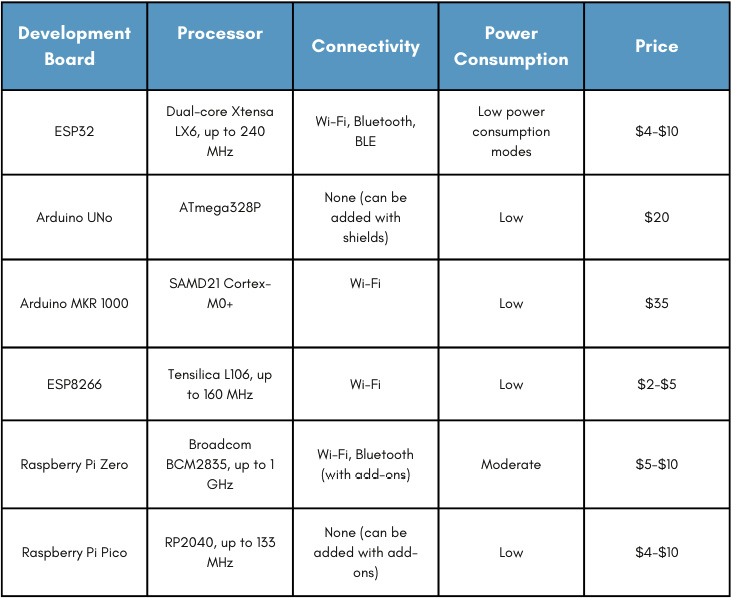Understanding the capabilities of ESP32 for IoT
In the previous section, we discussed a lot about IoT. ESP32 is equipped with built-in Bluetooth (supporting Low Energy, or LE), and Wi-Fi makes it the perfect candidate for IoT use cases. It can help in various layers of the IoT architecture. For example, it can serve as a sensor node in the sensing layer, which can help us collect and transmit data from various sensors; it can also work as a gateway or a hub in the network layer, collecting data from multiple nodes and forwarding it to the cloud or other devices; it can be used for data analysis and processing, and can also be used in the application layer in the form of wearable devices or robotics.
The versatility of ESP32 makes it an ideal candidate for IoT applications, and in this section, we will be discussing more details about ESP32, its different variants, and a brief comparison of ESP32 with other development boards available for IoT development.
A brief overview of the ESP32 board and its variants
As discussed in the introduction, ESP32 helps a lot in IoT development, but there are several variants of ESP32 microcontrollers on the market. Some popular ones include ESP32-WROOM, ESP32-WROVER, ESP32-DevKitC, and ESP32-SOLO. The difference between all these variants is in their features, such as the amount of memory and number of pins, but the features that make it perfect for IoT development are common in almost all these variants. All variants of ESP32 are based on the same chip (that is, the ESP32 System on chip (SoC), which has a dual-core processor), and all variants have built-in Wi-Fi and Bluetooth LE (BLE) support and various input/output interfaces such as Universal Asynchronous Receiver-Transmitter (UART), Serial Peripheral Interface (SPI), Inter-Integrated Circuit (I2C), analog-to-digital converters (ADCs), digital-to-analog converters (DACs), and pulse-width modulation (PWM). You can read more about this at https://www.espressif.com/sites/default/files/documentation/esp32_datasheet_en.pdf.
ESP32 versus other development boards
When we say ESP32 is a perfect candidate for IoT development, it is not the only one. There are other options for IoT use cases. The following table will conclude why ESP32 is the best beginner-friendly option for getting started with IoT:

Figure 1.2 – Comparison of ESP32 with other IoT-enabled development boards
From the comparison table shown in Figure 1.2, we can see that ESP32 outperforms the other available development boards for IoT development in terms of price, power consumption, and connectivity options. However, other boards have other features that make them suitable for other applications; for example, Raspberry Pi Zero has a microprocessor and can run on the Linux OS, making it suitable for applications that require more computation power, and can be used to perform more complicated tasks.
To conclude, ESP32 provides Wi-Fi, Bluetooth, and BLE connectivity and provides interfaces for connectivity such as I2C, SPI, and UART, which can be used to connect other connectivity options such as a 5G shield, NarrowBand-IoT (NB-IoT) shield, or Long Range (LoRa) transmitter and receiver. Another advantage of using ESP32 is it provides low power consumption modes, such as deep sleep, and so on, which is one of the required features for IoT development.
In this section, we learned that built-in Wi-Fi and BLE capabilities enable ESP32 to be used in IoT-based applications, and the low power consumption and low prices make it one of the best development boards for IoT-based projects. Furthermore, we compared ESP32 with other development boards on the market. In the next section, we will learn about the capabilities of the Arduino IDE and program ESP32 using it.


























































